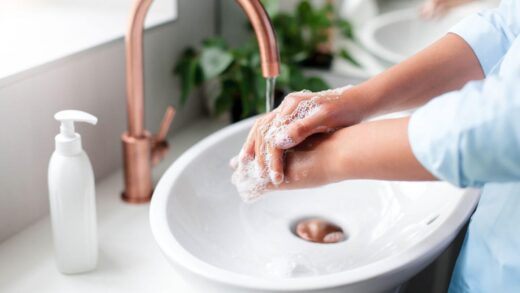Travel opens the door to new experiences, cultures, and environments but it also exposes you to unfamiliar germs, shared spaces, and disrupted routines. Whether you’re boarding a plane, checking into a resort, or dining in a foreign city, personal hygiene becomes more critical than ever during travel.
In warm climates and high-traffic tourist destinations, maintaining hygiene isn’t just about comfort; it’s a powerful tool to prevent gastrointestinal infections, respiratory illnesses, skin conditions, and even more serious diseases. So how can you stay clean, safe, and healthy on the go?
This article provides a complete guide on how to stay hygienic while traveling, why hand hygiene is your best defense, what risks to avoid in airports and planes, and which hygiene products deserve a spot in every travel bag.

Why Is Hygiene Important During Travel?
Travel often involves crowded environments, limited access to clean facilities, and exposure to pathogens your body isn’t used to. When your immune system is already dealing with the stress of jet lag, dehydration, and unfamiliar food, even a minor lapse in hygiene can lead to illness.
The Most Common Travel-Related Health Issues Include:
- Gastrointestinal infections (food poisoning, traveler’s diarrhea)
- Respiratory illnesses (colds, flu, COVID-19)
- Skin infections or irritations
- Urinary tract infections
- Fungal infections, especially in warm, humid climates
Most of these can be avoided or their risk significantly reduced with basic but consistent hygiene practices.
How to Stay Hygienic While Traveling
Whether you’re on a long-haul flight or staying in a beach resort, these tips can help you minimize exposure to harmful microbes:
✅ Wash Your Hands Regularly
Use soap and clean water whenever possible especially before eating and after using the restroom. If water is not available, use a hand sanitizer with at least 60% alcohol.
✅ Avoid Touching Your Face
Your eyes, nose, and mouth are gateways for bacteria and viruses. Keep hands away from your face unless freshly cleaned.
✅ Wipe Down Surfaces
In planes, buses, or hotel rooms, wipe down frequently touched surfaces like:
- Seatbelt buckles
- Tray tables
- Remote controls
- Door handles
- Bathroom counters
✅ Change Clothes After Long Outings
Don’t sit or sleep in the same clothes you wore during long public exposure. Germs can cling to fabric and transfer to your body or pillow.
✅ Use Personal Items Only
Avoid sharing razors, towels, or even phone chargers germs spread more easily than we think in communal settings.
Why Is Hand Hygiene So Important During Travel?
Hands are the main vehicles of germ transmission. Every doorknob, ATM button, luggage trolley, or shared table holds invisible microbes from countless travelers.
According to the World Health Organization, proper hand hygiene reduces the risk of gastrointestinal infections by up to 50%, and respiratory infections by more than 20%.
Hand Hygiene Best Practices While Traveling:
- Use alcohol-based hand sanitizer before and after meals, and when soap and water aren’t available.
- Wash with soap for at least 20 seconds, scrubbing between fingers and under nails.
- Dry hands with disposable paper towels or air dryers avoid cloth towels in public spaces.
- Carry moisturizer to prevent dry or cracked hands (which are more prone to infection).
How to Stay Clean in Shared Spaces
Shared hotel rooms, public restrooms, pools, and dining areas can become breeding grounds for bacteria, especially during peak travel season.
Hygiene Tips for Shared Spaces:
- Public Restrooms: Use tissue to touch flush buttons, taps, and door handles. Avoid placing personal items (like toothbrushes) directly on counters.
- Hotel Rooms: Wipe down remote controls, light switches, and nightstands upon arrival. Use your own towel or pillowcase if sensitive to detergents.
- Gyms or Spa Facilities: Wear flip-flops in showers and steam rooms, and sanitize equipment before and after use.
- Buffet Areas: Use hand sanitizer before eating and avoid touching food with bare hands.
Always assume shared surfaces are contaminated; precaution is easier than treatment.
What Are the Health Risks During Air Travel?
Airports and airplanes combine several risk factors: limited ventilation, high passenger turnover, and confined spaces. Though modern aircraft use HEPA filters to purify cabin air, the biggest risk remains surface and person-to-person transmission.
Common In-Flight Health Concerns:
- Colds and flu from close contact or poor air circulation
- Gastrointestinal issues due to contaminated hands or food
- Deep vein thrombosis (DVT) from prolonged immobility
- Skin dryness and dehydration due to low cabin humidity
Protective Measures for Plane Travel:
- Sanitize seat, tray table, and armrests before settling in
- Bring your own neck pillow, blanket, and headphones
- Wear a mask in crowded or poorly ventilated areas (if advised)
- Stay hydrated bring a refillable water bottle and avoid excessive alcohol
- Stand up or stretch every 1–2 hours during long-haul flights
Even short flights can expose you to many surfaces touched by thousands. Hygiene vigilance is key.
What Hygiene Products Should Be in Every Travel Bag?
Smart packing can prevent unnecessary trips to the pharmacy or worse, the emergency room.
Must-Have Hygiene Essentials for Travel:
- ✅ Hand sanitizer (60–70% alcohol)
- ✅ Antibacterial wet wipes
- ✅ Pocket-size tissue packs
- ✅ Travel-size soap or body wash
- ✅ Travel toothbrush and case
- ✅ Deodorant and talc-free powder (for sweat-prone areas)
- ✅ Moisturizer or hand cream
- ✅ Personal razor, nail clipper, and comb
- ✅ Extra underwear and socks
- ✅ Face mask (if traveling in crowded areas or during flu season)
- ✅ Basic first-aid kit (including plasters, antiseptic cream, and painkillers)
Optional but useful items: toilet seat covers, earplugs, eye masks, and a small laundry bag for used items.
Is Hand Sanitizer Alone Enough?
Hand sanitizer is a great backup, but it’s not a complete replacement for soap and water especially when hands are visibly dirty or greasy. Its effectiveness also depends on:
- The alcohol concentration (minimum 60%)
- The coverage (both hands, all surfaces)
- Duration of rubbing (at least 20 seconds)
Use sanitizer frequently, but combine it with regular handwashing and general hygiene for full protection. Also, remember to moisturize dry skin is more susceptible to cracking and infection.
When Should You Seek Medical Help While Traveling?
Despite your best efforts, illness can still strike. Seek medical attention if you experience:
- Persistent fever or gastrointestinal symptoms
- Skin rashes that spread or become painful
- Severe dehydration, fatigue, or disorientation
- Persistent coughing or difficulty breathing
- Urinary discomfort or blood in urine
Knowing where to find a reliable hospital or clinic at your travel destination is part of being prepared.
Travel Safely with Confidence

If your summer trip takes you to Türkiye and you experience any signs of infection, illness, or discomfort Erdem Hospital in Istanbul offers world-class care for international travelers. With multilingual staff, fast diagnostics, and expert teams across internal medicine, urology, dermatology, and infectious disease, Erdem Hospital is equipped to handle your healthcare needs discreetly and professionally. Whether it’s a minor skin rash or a more serious condition, our goal is to get you back to enjoying your trip with confidence and peace of mind. With over 37 years of medical excellence, you’re in safe hands no matter where your journey takes you.